De Engelse schrijver Charles Dickens werd geboren op 7 februari 1812 in Landport. Zie ook mijn blog van 7 februari 2007 en ook mijn blog van 7 februari 2008 en ook mijn blog van 7 februari 2009 en ook mijn blog van 7 februari 2010.
Uit: Hard Times
„Coketown, to which Messrs. Bounderby and Gradgrind now walked, was a triumph of fact; it had no greater taint of fancy in it than Mrs. Gradgrind herself. Let us strike the key-note, Coketown, before pursuing our tune.
It was a town of red brick, or of brick that would have been red if the smoke and ashes had allowed it; but as matters stood, it was a town of unnatural red and black like the painted face of a savage. It was a town of machinery and tall chimneys, out of which interminable serpents of smoke trailed themselves for ever and ever, and never got uncoiled. It had a black canal in it, and a river that ran purple with ill-smelling dye, and vast piles of building full of windows where there was a rattling and a trembling all day long, and where the piston of the steam-engine worked monotonously up and down, like the head of an elephant in a state of melancholy madness. It contained several large streets all very like one another, and many small streets still more like one another, inhabited by people equally like one another, who all went in and out at the same hours, with the same sound upon the same pavements, to do the same work, and to whom every day was the same as yesterday and to-morrow, and every year the counterpart of the last and the next.
These attributes of Coketown were in the main inseparable from the work by which it was sustained; against them were to be set off comforts of life which found their way all over the world, and elegancies of life which made, we will not ask how much of the fine lady, who could scarcely bear to hear the place mentioned. The rest of its features were voluntary, and they were these.
You saw nothing in Coketown but what was severely workful. If the members of a religious persuasion built a chapel there — as the members of eighteen religious persuasions had done — they made it a pious warehouse of red brick, with sometimes (but this is only in highly ornamental examples) a bell in a birdcage on the top of it.“
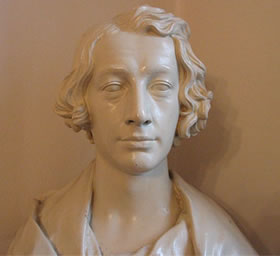
Charles Dickens (7 februari 1812 – 9 juni 1870)
Buste door Henry Dexter, 1842
De Franse schrijfster Christine Angot werd geboren op 7 februari 1959 in Châteauroux. Zie ook mijn blog van 7 februari 2009 en ook mijn blog van 7 februari 2010.
Uit: Pourquoi le Brésil ?
„J’étais tellement fatiguée, et je n’en pouvais tellement plus, que j’en étais arrivée à la conclusion, qu’il fallait que j’organise ma vie en fonction d’un bien-être physique. Et que j’évite tout le reste, c’est-à-dire l’amour. Longtemps je me suis demandé comment faisaient les autres. Et puis j’ai pensé que j’étais différente des autres. Je ne pouvais plus me régénérer. Il m’arrivait de rencontrer des gens comme moi, ils n’en pouvaient plus non plus. J’étais tellement fatiguée, tellement épuisée, je n’en pouvais plus, je me demandais combien de temps j’allais encore tenir. C’était trop. Je ne tenais plus. J’étais tellement à bout que à l’époque j’aurais aimé qu’on m’emporte sur une civière ou dans une clinique. J’étais épuisée. Je n’arrivais plus à me reposer par moi-même. Je ne trouvais plus aucun réconfort en moi-même ni autour de moi. Je ne dormais pas assez. J’en étais à l’époque à une barrette entière de Lexomil et à huit comprimés de Spasmine par nuit. Et je ne dormais pas toujours. Si par malheur je me trouvais dans des conditions moyennes, par exemple un sommier en bois, je voulais mourir, je ne supportais plus rien. Je n’avais plus aucune énergie, j’étais crevée, je ne résistais à rien, je n’arrivais plus à résister à rien. Quand on me disait « repose-toi » je me disais : est-ce qu’ils connaissent ces gens-là le sens du mot épuisée ? É-pui-sée. Épuisée. Épuisée, épuisée.
Fatiguée. Pourquoi ? J’en avais marre. Épuisée, ça veut dire qui ne peut plus produire, comme une terre épuisée, une source épuisée. C’était horrible. Pas vide, je n’étais pas vide. J’étais fatiguée. Et je me demandais comment j’allais tenir. Je n’avais même plus envie qu’on m’approche, je n’avais même plus envie qu’on me caresse. Je connaissais tous les pièges. Je pouvais terminer leurs phrases avant qu’ils ne les commencent, je connaissais tout. L’amour ce n’était pas pour moi, j’étais trop lucide, je connaissais ça.“
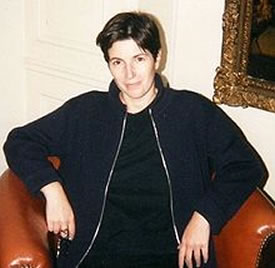
Christine Angot (Châteauroux, 7 februari 1959)
De Australische schrijver Peter Carey werd geboren op 7 februari 1943 in Bacchus Marsh (Victoria). Zie ook mijn blog van 7 februari 2007 en ook mijn blog van 7 februari 2008 en ook mijn blog van 7 februari 2009 en ook mijn blog van 7 februari 2010.
Uit: Parrot and Olivier in America
„I had no doubt that something cruel and catastrophic had happened before I was even born, yet the comte and comtesse, my parents, would not tell me what it was. As a result my organ of curiosity was made irritable and I grew into the most restless and unhealthy creature imaginable — slight, pale, always climbing, prying into every drain and attic of the Château de Barfleur.
But consider this: Given the ferocity of my investigations, is it not half queer I did not come across my uncle’s célérifère?
Perhaps the célérifère was common knowledge in your own family. In mine it was, like everything, a mystery. This clumsy wooden bicycle, constructed by my uncle Astolphe de Barfleur, was only brought to light when a pair of itinerant slaters glimpsed it strapped to the rafters. Why it should be strapped, I do not know, nor can I imagine why my uncle — for I assume it was he — had used two leather dog collars to do the job. It is my nature to imagine a tragedy — that loyal pets have died for instance — but perhaps the dog collars were simply what my uncle had at hand. In any case, it was typical of the riddles trapped inside the Château de Berfleur. At least it was not me who found it and it makes my pulse race, even now, to imagine how my mother might have reacted if I had. Her upsets were never predictable. As for her maternal passions, these were not conventionally expressed, although I relished those occasions, by no means infrequent, when she feared that I would die.”

Peter Carey (Bacchus Marsh, 7 februari 1943)
De Amerikaanse schrijfster Emma Lanier McLaughlin werd geboren op 7 februari 1974 in Elmira, New York. Zie ook mijn blog van 7 februari 2009 en ook mijn blog van 7 februari 2010.
Uit: The Nanny Diaries
„In the middle is a round table with a vase of flowers that look as if they might die, but never dare wilt.
This is my first impression of the Apartment and it strikes me like a hotel suite–immaculate, but impersonal. Even the lone finger painting I will later find taped to the fridge looks as if it were ordered from a catalog. (Sub-Zeros with a custom-colored panel aren’t magnetized.)
She offers to take my cardigan, stares disdainfully at the hair my cat seems to have rubbed on it for good luck, and offers me a drink.
I’m supposed to say, “Water would be lovely,” but am often tempted to ask for a Scotch, just to see what she’d do. I am then invited into the living room, which varies from baronial splendor to Ethan Allen interchangeable, depending on how “old” the money is. She gestures me to the couch, where I promptly sink three feet into the cushions, transformed into a five-year-old dwarfed by mountains of chintz. She looms above me, ramrod straight in a very uncomfortable-looking chair, legs crossed, tight smile.
Now we begin the actual Interview. I awkwardly place my sweating glass of water carefully on a coaster that looks as if it could use a coaster. She is clearly reeling with pleasure at my sheer Caucasianness.
“So,” she begins brightly, “how did you come to the Parents League?”
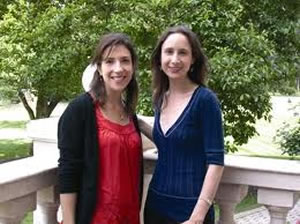
Emma McLaughlin (Elmira, 7 februari 1974)
Nicola Kraus (l) en Emma McLaughlin (r)
De Nederlandse dichter en schrijver A. den Doolaard werd geboren op 7 febrauri 1901 in Hoenderloo. Zie ook mijn blog van 7 februari 2007 en ook mijn blog van 7 februari 2008 en ook mijn blog van 7 februari 2009 en ook mijn blog van 7 februari 2010.
Uit: Oriënt-Express
„Het laatste licht zakte net uit de hooischelven weg toen Kosta met zijn zwaarbeladen ezel in het dorp aankwam. Hij had niets verkocht en daarom ook niets gedronken; en voelde zich nu kriegel en dorstig als een distel aan de wegkant. De ezel trippelde vlug, want Kosta had uit wraak een doornstok gesneden die hij in de maat hanteerde: op elke vier stappen een tik. Maar opeens bleef de stok, waarmee hij donkere cirkels door de schemering sloeg, stijf in de lucht staan.
‘Kosta! Kosta! Een brief!’
Bojan zat schrijlings op zijn muildier, hield zijn linkerduim door de kieuw van een bungelende forel gehaakt, en zwaaide in zijn rechterhand iets blauws. ‘Een brief van je mooie nichtje, dat voor de sprekende plaatjes speelt!’ schreeuwde hij.
Kosta liet de ezel voor de staldeur staan, en trapte in een plas terwijl hij op Bojan toesprong. Het adres was uitgewischt; maar hij rook er aan en wist toen dadelijk dat de brief werkelijk van Milja was; want alles aan haar rook naar een vocht dat zij uit bloemen scheen te persen. ‘De postbode heeft hem mij gegeven,’ ratelde Bojan, ‘want jij was net weg, ik had hem op de zak meel gedaan onder het touw, maar bij de beek is hij er uitgegleden, en daarom kan je het adres niet meer zien, maar dat is niet erg, want ik wou je vragen een glas raki bij mij te komen drinken. Een mooie forel, hè?’
Kosta had de brief zwijgend opengescheurd. Het schrift zag er uit alsof er op gehuild was, maar het rook naar Milja en dat was voor Kosta voldoende. Die lastige letters, daar zou hij thuis wel achter komen.“
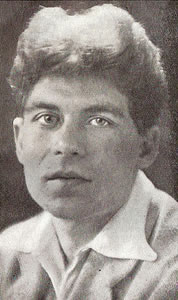
A. den Doolaard (7 februari 1901 – 26 juni 1994)
In 1926
De Amerikaanse schrijver en journalist Gay Talese werd geboren op 7 februari 1932 in Ocean City. Zie ook mijn blog van 7 februari 2008 en ook mijn blog van 7 februari 2009 en ook mijn blog van 7 februari 2010.
Uit: Honor Thy Father
„Knowing that it is possible to see to much, most doormen in New York have developed an extraordinary sense of selective vision: they know what to see and what to ignore, when to be curious and when to be indolent; they are most often standing indoors, unaware, when there are accidents or arguments in front of their buildings; and they are usually in the street seeking taxicabs when burglars are escaping through the lobby. Although a doorman may disapprove of bribery and adultery, his back is invariably turned when the superintendent is handing money to the fire inspector or when a tenant whose wife is away escorts a young woman into the elevator—which is not to accuse the doorman of hypocrisy or cowardice but merely to suggest that his instinct for uninvolvement is very strong, and to speculate that doormen have perhaps learned through experience that nothing is to be gained by serving as a material witness to life’s unseemly sights or to the madness of the city. This being so, it was not surprising that on the night when the Mafia chief, Joseph Bonanno, was grabbed by two gunmen in front of a luxury apartment house on Park Avenue near Thirty-sixth Street, shortly after midnight on a rainy Tuesday in October, the doorman was standing in the lobby talking to the elevator man and saw nothing.“
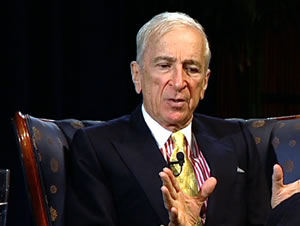
Gay Talese (Ocean City, 7 februari 1932)
Zie voor nog meer schrijvers van de 7e februari ook mijn vorige blog van vandaag en eveneens mijn eerste blog van vandaag.
